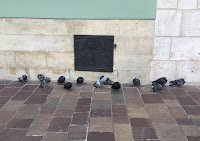Alison Hicks (University College London, UK) began by identifying some ways in which theory can be used. The presenters had noted that theoretical work often happens without understanding of foundations, and there was a need to reflect on theory and its relationship with application and practice. Hicks explained that it had been a 2 year project with 13 people from different parts of the world, involving 2 online workshops and an iterative processes of writing. They started by doing some conceptual mapping of the work done in information literacy, undertaking a deep literature review to identify different theoretical approaches. These approaches included critical theory, practice theory, sociotechnical and sociopolitical (and some others), and they extracted 50 papers. These were coded and they identified 5 themes: tensions between agency and enactment; legitimacy of information (what counts as information); moral imperative of information literacy (they noted that there is little challenge of the benefits of being informed); socially situated shape of information literacy; marginalisation (e.g. issues of power and privilege).
Following on from this each presenter talked about a theoretical stance that they espoused/used.Veronica Johansson (University of Boras, Sweden) talked about the theoretical approach of Critical Design, identifying with critical literacy rather than information literacy. The originators of Critical Design had said that all design can be affirmative (problem solving) or critical (problem finding - designing in a way that highlights biases etc.). This can be applied in for example looking at the way search results are presented, or the way in which books are classified and arranged, or in looking at indigenous ways of mapping rather than conventional western mapping.
Jutta Haider (University of Boras, Sweden) talked about sociomateriality as an approach, which may use metaphors and conceptual devices; exploring the actors, the material aspects of information literacy, to explore the meaning and practices (including information literacy practices) arising from interaction and co-constitution.
Ola Pilerot (University of Boras, Sweden) talked about the theoretical stance of institutional ethnography. This sees information literacy as an institution (a phenomenon that has become an institution: with a common literature, values, practices, actors, sites and contexts). This approach saw the local connected to the "extra local" with "ruling relations" (with the example of the ACRL framework having a local and international impact). Texts and material objects are important in shaping practices (e.g. syllibi, texts). The researcher's job is to identify and elucidate the ruling relations, zooming into local practice and then zooming out.
Noora Hirvonen (University of Oulu, Finland) talked about mediated discourse theory, seeing information literacy in a nexus of practice. Dscourse is viewed as multimodal (manifested in objects, actions etc not just words). Action is seen as mediated by the social and cultural. The attention is focused on a nexus of action - examining a "network of linked practices" where things come together the create action.
Following this, the panel discussed whether there are tensions in how the theories fit with, or challenge, each other (and whether it matters). They noted that there was a wider range in the book, and the panellists who had been able to attend were comparatively closer. However, overall, although there might be some tensions, it was productive and important to use these different approaches. The main issue raised was that of the relationship between critical literacy or information literacy (though that could also be productive).
The 2nd part of the session involved each panelist talking about the opportunities and challenges of each of the theoretical approaches they had talked about.
Hirvonen identified that discourse theory directs attention to "the dialogical relationship between the material world and discursive constructs", with social action at its centre. This "may help acknowledge the multimodaility of information and IL practices" including looking at the relationship between understandings of IL experienced by individuals and seeing it in a social context noticing "how IL can both enable and constrain actions".
Haider identified that an issue was - deciding what to investigate when meaning only emerged through interaction - and this involved "embracing definitional ambiguity". Part of it involved investigating "moments of stability". Also it can be used as a sensitising concept in approaching research. Haider mentioned being responsive to the messiness of the world, also with a having a social justice approach. As part of this she talked about resisting fetishisation of technology, not being intimidated by corporate information infrastructure [I think including search engines etc.], also considering the way in which these structures and infrastructures make it difficult to refuse them - so you could adopt a punk (authority resisting) approach.
Johansson reiterated that she relates critical design to critical literacy. Critical design involves reflecting on something desgned, in our daily lives, stimulating thoughts on underlying power imbalances that are produced and reproduced in designed objects (which can include designed objects such as search engines). Johansson sees this as a postsrutucturalist approach, where materiality is important, and it explores what we mean by reality (and what realities are constructed through the power structures and values that result in the designed objects/systems). Johansson saw the rich repetoire of methods as being one of the key benefits of using this approach. For example, one may critique, speculate and present critical alternatives.
Pilerot identified institutional ethnography as providing a "dual analytical perspective where the local is seen as connected to the extra-local" which shows information literacy in its local context and also how it is connected to things outside the local. This was seen as a "bottom up" approach examining local practice and interelatedness/interaction then tracing the ruling relations. He gave an example of using Web of Science and how you could trace the ruling relations (of how material is selected for inclusion, the underlying publication power structures etc.). Pilerot also noted that it is related to other approaches such as prctice theory and sociocultural theory.
Hicks then pulled some strands together, noting that there are many ways to theorise (different frameworks used; where attention is focused; approaches to theory - pedagogical, situational or ideological), and also that there are new themes emerging (e.g. to do with discourse & power; the decentring of language; revisitingand critiquing premises)
The presentation part finished by the panelists addressing the questions of why theorisation of information literacy matter and how the theoretical work might translate into action. Some points that arose from this concerned how you dealt with normative aspects, and how some research arose from action, so could not be divided from it. Also there was the question of what kind of phenomenon it was. This was followed by a discussion amongst the audience.
















